The Sound of Community:
The Uplifting LGBTQIA+ Stories in Storm Miguel Florez’s Films
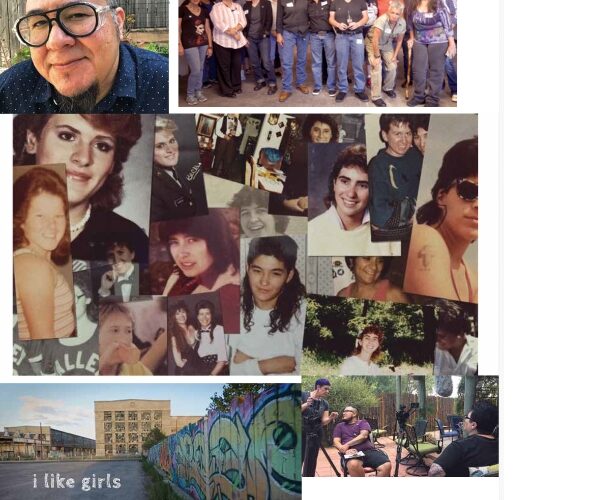 StormMiguel Florez. Photograph by Gordon Garcia. · Women reunite and reminisce about their community and being out in high school in the 1970s and 1980s. Production still from The Whistle, 2019. Courtesy of StormMiguel Florez. · Collage of Albuquerque lesbian youth in the 1980s. The Whistle, 2019. Courtesy of StormMiguel Florez. · Director of Photographgraphy, Annalise Ophelian; Director, StormMiguel Florez; Participant, Michelle Martinez. The Whistle, 2019. Photograph by Jai James. · i like girls. Production still from The Whistle, 2019. Courtesy of StormMiguel Florez.
StormMiguel Florez. Photograph by Gordon Garcia. · Women reunite and reminisce about their community and being out in high school in the 1970s and 1980s. Production still from The Whistle, 2019. Courtesy of StormMiguel Florez. · Collage of Albuquerque lesbian youth in the 1980s. The Whistle, 2019. Courtesy of StormMiguel Florez. · Director of Photographgraphy, Annalise Ophelian; Director, StormMiguel Florez; Participant, Michelle Martinez. The Whistle, 2019. Photograph by Jai James. · i like girls. Production still from The Whistle, 2019. Courtesy of StormMiguel Florez.
By Lazarus Letcher
Early in his documentary The Whistle, StormMiguel Florez muses about his LGBTQIA+ friends who grew up in other parts of the country in the ’70s and ’80s who always say, “I didn’t know anybody like me.”
Florez retorts, “Albuquerque was packed full of queers back then!” Later in the film, we see a woman holding a scrapbook. It shows the wear and tear of being well-loved over many years. A bumper sticker reading “Get Wrecked” falls out of it and she chuckles. To her, it’s a scrapbook of cherished memories. To our underrepresented community, it’s a treasure trove, an archive, a key to reminding us that we’ve always been here and we’re not going anywhere.
Thanks to this woman and several others in StormMiguel’s The Whistle, New Mexico’s incredible queer, predominantly lesbian history won’t be forgotten anytime soon. Code phrases like “get wrecked,” “took a walk on the wild side,” and the eponymous whistle were secret ways for lesbians in Albuquerque to connect decades before it was safe to be out in the open. Florez set out to find the origins of the codes of his youth, growing up as a lesbian in Albuquerque in the ’70s and ’80s. High school pictures of his glorious mullet often grace the screen as he takes us down memory lane, accompanied by rare and beautiful queer ephemera and hand-drawn animations.
Trans filmmaker Florez is New Mexican to the bone. His roots run deep—he was born in Albuquerque, his father is from Roswell, and his mother is from San Acacia. Florez identifies as Chicane, a gender-neutral spelling of Chicano/Chicana that’s easier to pronounce in Spanish than Chicanx. He feels lucky that he grew up in a home not profoundly wed to the Spanish myths espoused by many classmates. He got into arguments on the playground, where he said, “We’re not Spanish; we’re Mexican,” a sentiment not shared by most of his peers. Florez credits his early understanding of his people and culture to an older cousin who often talked about their family history and the Chicane movement—Florez said it would be years until anyone in the family began using the term “Hispanic.”
In the B reel of The Whistle, shots of backwoods bosque trails lavished in leaf-filtered light demonstrate the care of someone who knows and loves cottonwoods, the Rio, and this place deeply. The care he takes in every aspect of his work is reflected in his interviews, capturing a rare and beautiful moment in Albuquerque’s queer history. It’s a history that’s hard to capture, with transient members, illegal lives, and exclusion from institutions, until recently. While New Mexico was one of the earliest states to legalize sodomy in 1975, that doesn’t mean the LGBTQIA+ community was warmly embraced; living out loud and daring to document it could lead to firing, ostracization, or even death.
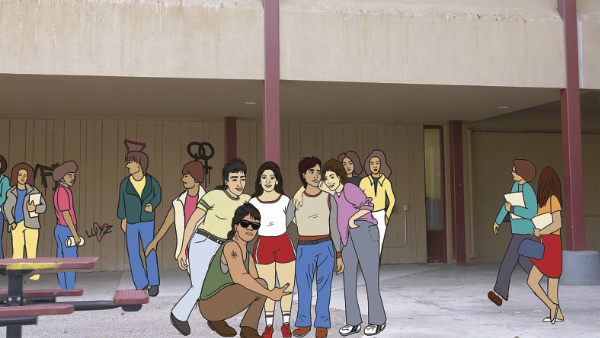
Florez tried turning to official archives to hunt down some answers for his film, but LGBTQIA+ archives are few and far between, and the ones that covered New Mexico’s queer and trans history skew alarmingly white for a state that’s majority-minority. Our history often feels like folklore. Our lives and history aren’t easily found neatly cataloged on library shelves, but in the memories of the elders we still have and the ephemera and scrapbooks that survive. Hannah Abelbeck, curator of archival photos at the New Mexico History Museum, said this struggle is especially present in New Mexico.
“New Mexico has vibrant and unique LGBTQIA+ histories. But they really aren’t very accessible to outsiders, not even for LGBTQIA+ people across communities or across generations,” Abelbeck says. “And when you can find them, they are generally not told very well. There are a number of reasons for that, starting with typical problems in queer historiography and extending to unique and surprising things about New Mexico in particular.”
The Whistle is an accessible and rare glimpse into this history. Florez’s artistic career didn’t start with film, but with music. During the time captured in The Whistle, Albuquerque had a robust feminist and lesbian music scene. Florez was lured out of his shell to begin performing—of all places—with a church youth group. His girlfriend at the time dumped him, citing her commitment to Christianity as the end of her queerness, and Florez almost followed suit. Thankfully, he was saved by the 1988 Albuquerque Women Fest, and he jokes that the pivotal event made him “a born-again lesbian.” Florez spent his teenage years performing around Albuquerque as a solo artist and in queer bands before moving to the Bay Area in California in his early twenties.
StormMiguel’s first venture into filmmaking was a music video, quickly followed by helping his partner Annalise Ophelian create and edit a documentary about the inimitable and unmovable Black trans icon Miss Major, titled MAJOR! Florez caught the filmmaking bug, and after talking to some childhood friends, he knew he had to make a movie chasing down the mysterious lesbian whistle of his youth. Florez first heard and used the whistle in the late ’80s, learning it from other lesbians around Albuquerque, but its origin went back further and farther than he could have imagined.
The whistle is created by sharply inhaling, producing a note so high it sounds similar to a dog whistle. During Florez’s time in the late ’80s at Albuquerque’s Del Norte High School, he and his queer comrades from neighboring schools would use this whistle to communicate in groups, “Hey, I’m here, I’m queer, let’s hang.”
Florez first used social media to try to find folks who might know where the mysterious whistle came from. Then, he interviewed old high school friends and put together a teaser trailer to try to find more folks to interview.
Florez was met with mostly excitement but some skepticism, with some women saying, “Who’s this man making a documentary about us?” For trans creators revisiting our past for stories, it can be tricky to navigate and explain, “This is who I am, this is who I was, this is my connection,” and thankfully, Florez was mostly met with open arms. In the trans-masculine community, there can be some fear when it comes to interacting with our peers under the rainbow umbrella—will butch lesbians see us as traitors, will women see us as abandoning the movement, will I be seen as an outsider to the outsider? Although we grew up at different times, Florez and I have both navigated these questions and fears in our transitions. Florez says making The Whistle and meeting and connecting with butch lesbian elders was especially healing.
Through the teaser trailer, Florez was able to meet with members of the queer community older than him; he was part of the last generation to use the whistle and was surprised by how far back it truly went. For Florez, chasing the origins of the whistle became the vehicle for telling the story of an extensive and supportive network of queer youth in the 1970s and 1980s in Albuquerque, and he was shocked when he found the genesis of the high-pitched siren song. I won’t ruin the surprise, but I will say the origins of the whistle demonstrate the importance of queer connection, the magic of the Borderlands, and the LGBTQIA+ community’s indefatigable effort to find each other, no matter what.
The world premiere of The Whistle took place at Albuquerque’s historic KIMO Theater in September 2019. Watching the documentary in 2023 is bittersweet. I was in high school in the early aughts as fights for gay marriage raged, and trans representation was saved for trashy daytime TV. I was out to only a few close friends, and I could count the number of peers who were out to everyone, including family, on one hand. I was already Black in small-town Indiana; I didn’t need to add another burden to my shoulders. Seeing high schoolers in the ’70s and ’80s be out to each other and their families in The Whistle was truly wild.
Although the stories in the documentary are mostly positive portrayals of finding community, friendship, and themselves, bullying was a factor in the subjects’ lives. Homophobic harassment led to one interviewee dropping out of high school and another being expelled once outed. Being out at school was not entirely safe, so the whistlers mostly connected either at sporting events or at the myriad gay bars in Albuquerque with the help of fake IDs. Even in the ’70s and ’80s, these gay establishments were still getting raided. At the time, the subjects of the documentary thought the raids related to them being underage guests; it wasn’t until they were in their thirties they realized that these were coordinated homophobic attacks by the Albuquerque Police Department.
One montage that was surprising to me as a viewer—and even to Florez as a director—was of several stories of mental health professionals that his childhood friends shared. Every interviewee who was taken to a therapist was supported by the mental health professional, and the parents were told to change their attitudes. These young people were being sent to therapists when their bible, the Diagnostic and Statistical Manual for Mental Disorders (DSM), still classified homosexuality as a “sociopathic personality disturbance.” In the documentary, Florez’s pediatrician soothed his mother’s worries over his queerness by saying, “Well, I can tell you it’s a lot safer than your child sleeping with every boy on the block.” While making the film, Florez reconnected with his old pediatrician and discovered that she went on to relay this story during trainings to help other physicians navigate how to respond to parents trying to “fix” queer kids. Despite our small population and placement at the bottom of several national lists of state rankings, New Mexico has long been a relatively safe space for the LGBTQIA+ communities, and these medical professionals going against the grain decades before the rest of the country is more proof of how deep our rainbow roots run.
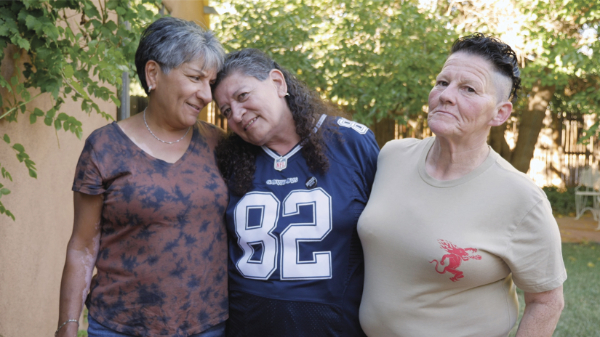
I’ve been lovingly entrapped by the Land of Enchantment for nearly a decade. Growing up primarily in small towns in the Midwest, Albuquerque felt like a bustling metropolis with an actual gay scene at first. Watching the folks in The Whistle rattle off an extensive list of not just queer bars but lesbian bars left me with my mouth hanging open. Of the several listed, only the Albuquerque Social Club remains. In the film, Florez narrates some of his old haunts while he drives around Albuquerque. As he pans to a venue that used to be a lesbian bar with a marquee that now reads His Place Ministries he sarcastically says, “clearly not a lesbian bar anymore.” Since the 1980s, over two hundred lesbian bars have permanently shuttered across the U.S., with Albuquerque being no exception. According to the creators of The Lesbian Bar Project, these closures are the result of gentrification, misogyny impeding access to financial support, and the rise of dating apps. The closures threaten centuries of seeking sanctuary at a bar and meeting other queer people there.
While never explicitly named, the documentary is haunted by the impending AIDS epidemic and the corresponding meteoric rise of the Christian Right. The stories shared in the documentary are nestled between the Stonewall Rebellion and losing nearly 330,000 queer and trans folks to AIDS—and the U.S. government’s inaction. Florez says the Albuquerque lesbian scene was a bit separate from the gay men’s spaces and he can’t quite pinpoint when the epidemic came to ’Burque. He says when he came out as a lesbian, some people would ask if he was worried about AIDS. The gay bars at the time were one of the few places where regular HIV testing was taking place. The whistlers weren’t oblivious to what was happening, but between being high schoolers and lesbians, they were somewhat sheltered from the chaos swirling through the LGBTQIA+ community nationally and internationally.
The documentary ends with a montage of news clips showing the threats that LGBTQIA+ youth faced in 2019. Watching it five years later, it’s heartbreaking knowing the list is much more extensive, with 2023 ushering in more anti-LGBTQIA+ bills than any legislative year. So many of the attacks aimed at queer and trans youth are backed by a claim that our LGBTQIA+ youth are something new, but The Whistle proves that we know who we are pretty dang early, and finding community is essential to our survival. It’s hard not to feel like we’ve gone two steps forward and one step back. Compared to a majority of the United States, New Mexico’s legislature and citizens have tended to be more progressive when it comes to protecting LGBTQIA+ individuals and our rights. In 2023, Governor Michelle Lujan Grisham signed House Bill 7, the Reproductive and Gender-Affirming Health Care Act, enshrining New Mexicans’ rights to our bodily autonomy, from reproductive rights to accessing gender-affirming medical services. This bill is a far cry from legislation passed by twenty-five states limiting transgender healthcare.
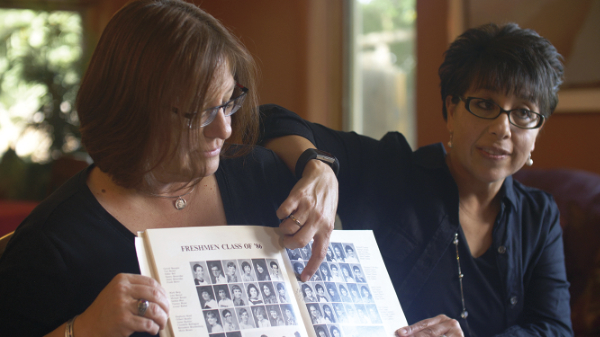
While queer and trans youth rights are under attack, the whistle generation is proof that having a supportive community nearly guarantees success. A lot of this community’s success can be attributed to the teacher featured in the film, Havens Levitt, who acted as a beacon to the younger generation. In one scene, Levitt recounts an interaction with a parent of one of her lesbian students, who thanks her for helping her daughter live authentically as herself. While Levitt had no legal protections as a gay teacher at the time, she said, “It was a pivotal moment for me where I just got this huge message that the people who don’t want me to support LGBT kids don’t matter. And the people who do, including the parents that love their kids and want them to be affirmed and, you know, be happy and … live happy lives, those are the people that I care about.”
While watching The Whistle and witnessing the solid lesbian community thrive nearly forty years before marriage equality was legalized in the United States, you can’t help but ask, “Why Albuquerque? Why then?” Albuquerque was never necessarily seen as a hotspot for queer people, like larger cities including San Francisco or New York City. When the whistle was born, Albuquerque’s population was just shy of a quarter million. Florez suspects that part of the equation was the fact that young women had the ability to be invisible more easily than gay men.
“We could kind of fly under the radar; people just thought we were jocks or tomboys,” he says. Florez also reflected on how less likely his friends of color were to be kicked out of their homes after coming out, even if the parents were less than accepting. He was particularly moved by his friend Gloria’s story of coming out to her mother, depicted in The Whistle. While crying on the porch after her first break up her mother comforted her, saying, “Don’t worry, there’s other girls out there.” When your community or family has experienced forced ruptures from colonization, turning around and doing the same thing to your child is a harder pill to swallow. The interviewees weren’t exempt from bullying or violence, but they found sanctuary in each other and received the care of some supportive adults.
As states across the country try to push queer teachers into closets and sweep representation from library shelves, it’s wild to look back in history and see it as more progressive in some regards. Florez and I discussed this double-edged sword of visibility—how so much of the recent pushback against queer and trans youth is partially due to the shift from secret codes and whistles to connecting openly online and in person. Decades ago, our numbers seemed smaller largely because people didn’t know we existed; now that we’re visible, our numbers continue to climb while our safety doesn’t seem to be keeping pace. The big emphasis on transgender visibility has helped folks like me recognize that other worlds and lives are possible, allowing us to come out—but it hasn’t decreased the violence the LGBTQIA+ community, and especially trans women of color, face.
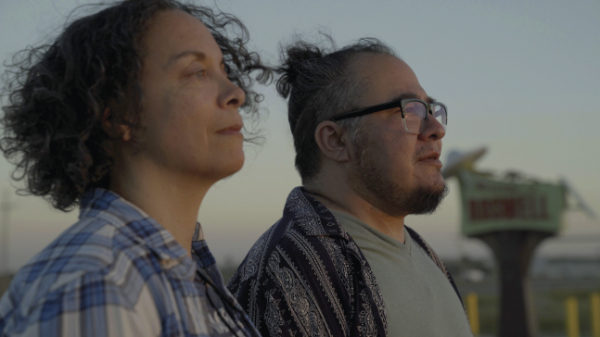
As Florez’s former documentary star (Florez doesn’t use the term “subject” to describe those in his films), Miss Major says in her memoir Miss Major Speaks: Conversations with a Black and Trans Revolutionary, “With all the visibility we’ve gotten—or I should say a few of us have gotten—over the past couple of years, it hasn’t done shit for most of the community. The murders they’re still happening. The body count keeps going up.”
Just this past summer, in the LGBTIQA+ sanctuary state of New Mexico, I was attacked with an AK-47 in an event I believe was motivated by hatred of my identity. Trans and queer stories in our media are a step in the right direction, and we can’t stop fighting for what’s happening off the screen and in our lives.
Last year, the New Mexico History Museum hosted a screening of The Whistle as well as a discussion with Florez and the film’s participants as part of their Hispanic Heritage Month programming. The film is an essential record of not just Albuquerque’s queer history, but Chicane and Latine history as well. While Florez doesn’t personally use the label Hispanic, he thinks the inclusion of the film in the museum’s programming was important “because even though it is not a film explicitly about being Latino/a/e, it is a film by a Chicane person that explores dynamics and culture that came directly from Latina lesbian and Latino gay community. Hispanic or Latino heritage and New Mexico history have always included queer and trans people, whether or not we are a part of the record, and so we absolutely belong in places that preserve and teach our stories and histories.” The film now lives in perpetuity on New Mexico PBS, where it can be viewed at no cost. Its accessibility is crucial: this is New Mexico’s history, and New Mexicans need to see it.
Florez’s current project, which recently received funding from the Sundance Institute, is a mockumentary titled Welcome to Roswell. He was inspired to make the film after taking a road trip to Roswell with his partner after being gone for over twenty years. On this trip, Florez laughed off his partner’s questions about the famed 1947 UFO craze. Florez said that growing up, no one ever mentioned the event—not even the family who lived in Roswell when it happened. As they rolled into town though, Florez was astounded to witness the transformation of the sleepy southern New Mexico town to a full-blown UFO and alien utopia, with flying saucers adorning nearly every building on Main Street.
Welcome to Roswell was partially inspired by this sojourn back to Roswell and all its weird glory. In the film, Florez plays Miguel, an overly serious documentarian, capturing his journey to Roswell, where he comes out to his family as trans. His plans go off the rails as his family and girlfriend focus instead on finding the truth behind the alleged 1947 UFO crash, remaining far too blasé over his “big reveal.” It was hard not to chuckle at Florez’s planned plot for the mockumentary—especially his spin on the classic coming-out narrative. So much of trans media fixates on our coming out journeys and our family members’ reactions. Often, the trans joy of coming out gets overshadowed by the cisgender “grief” family members experience over coming out and adjusting their views and expectation of us.
The 2020 Netflix documentary Disclosure covers the mostly problematic history of trans depiction in film. One moment that stuck out to me was how often trans “reveals” were used as gags (and often literally, like in Ace Ventura: Pet Detective when Jim Carey’s character vomits upon learning of his crush’s “truth”). Actress and activist Laverne Cox notes in the film that making trans people a laughing stock has real-world implications, saying, “I can’t even tell you how many times I’ve been in a public space, particularly early in my transition in New York City when I would walk into a subway car, and people would just burst into laughter as if my experience on that subway car was just a joke. And I think people have been trained to have that reaction.”
Welcome to Roswell will lead the way for trans comedies made by us and for us. We’re more than tragedy or grief, an oddity, or freaks—we’re people with stories to tell, and many of those stories are pretty damn funny. Welcome to Roswell will give us a rare chance to see a trans-driven comedy where we aren’t the butt of the joke and where our identities aren’t either inspirational or a harbinger of doom—because there are bigger fish to fry, like aliens.
With The Whistle and Welcome to Roswell, Florez is sharing the often-overshadowed positive experiences of being queer and trans, especially in the overlooked haven of New Mexico. The Whistle depicts a rare magical moment in time and space where queer kids were able to have community decades earlier than anyone might have imagined. Welcome to Roswell will open us up to new forays into the genre of comedy, where queer- and trans-driven films are not solely focused on our identities but on our community and our hijinks. In a time where things seem so dark for queer and trans folks in the U.S., Florez is providing a window to show the world New Mexico’s light.
—
Lazarus Letcher (they/them) is a Ph.D. candidate in American Studies at the University of New Mexico, focusing on linking homophobia and transphobia to white supremacy culture and examining QTBIPOC art as resistance. Laz has written for Autostraddle, them, and the occasional dry academic journal. You can read more of their work at LazarusLetcher.com and on Instagram @L.nuzzles.
